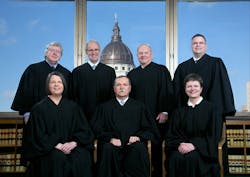Deja Vu: Kansas Supreme Court again rejects the state's school finance system
Funding for Kansas public schools is so inadequate that it violates the state's constitution, the state Supreme Court has ruled.
The Kansas City Star reports that the court has given the Kansas Legislature until the end of June to enact a school funding plan that meets the state's constitutional requirement for suitable school funding.
Lawyers for the school districts that brought the suit have estimated that constitutional compliance could cost the state from $400 million to more $1 billion in funding. That would be in addition to what are projected budget shortfalls in Kansas of more than $1 billion through the end of fiscal year 2019.
In its ruling, the court cited several deficiencies in Kansas public education: Nearly half of the state's African American students, more than one-third of the state's Hispanic students, and more than one-third of the state's students who receive free or reduced-price lunches are not proficient in reading and math.
"[W]e conclude the state's public education financing system, through its structure and implementation, is not reasonably calculated to have all Kansas public education students meet or exceed the minimum constitutional standards of adequacy," the court concluded in a unanimous opinion.
As it has done previously, the court is giving lawmakers the chance to pass legislation that corrects the funding deficiencies.
"Once a new financing system is enacted, the state will have to satisfactorily demonstrate to this court by June 30, 2017, that its proposed remedy is reasonably calculated to address the constitutional violations identified."
Thursday's ruling comes in a case that was first brought in 2010 and has generated several court rulings through the years. The case has been split into two parts—one part involved whether Kansas school funding is allocated equitably among school districts, and the second part involves the adequacy of the funding provided to schools.
Last year, justices ruled that the state's school funding was inequitable, and the legislature made changes that satisfied the Supreme Court's order for more equitable funding. Thursday's decision addressed the question of funding adequacy.
Senate Minority Leader Anthony Hensley issued a statement after the ruling.
“Today’s decision confirms what we already knew — Kansas schools are significantly underfunded, threatening the quality of education our children are receiving wherever they may reside in our state,” Hensley says
About the Author
Mike Kennedy
Senior Editor
Mike Kennedy, senior editor, has written for AS&U on a wide range of educational issues since 1999.
